We’ve all been there: short of change to feed a vending machine, struggling to make a car payment, or even unjustly convicted of treason for unwittingly providing medical assistance to an enemy of King James II. For all these challenges, there is a simple, easy solution: acquire a heavily armed ship1 and begin preying on less well-armed merchantmen. This is as true in space as on the high seas. You might be interested in the following five novels about SPACE PIRATES!!!
Space Viking by H. Beam Piper (1962)
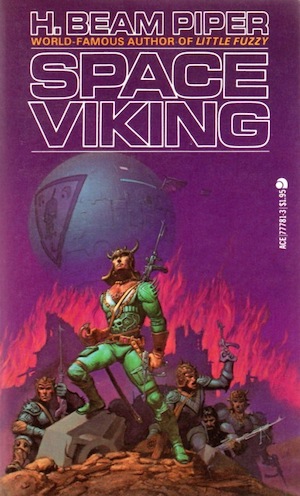
Lady Elaine and Lord Trask’s wedding day promised to be a wonderful celebration…until Lady Elaine was killed by rejected suitor Lord Andray Dunnan. Trask, her groom was severely wounded. By the time he recovers, Dunnan and his mercenaries have long since fled the planet in a hijacked starship. Revenge will perforce be delayed…but it will happen, if Trask has anything to do with it.
Trask commissions his own heavily armed starship and sets out to find Dunnan. It might seem a hopeless task. Dunnan could have fled to any of the thousands of settled worlds in the regions once ruled by the long-fallen Federation. How to fund what could be a long quest? Simple. Trask and Dunnan come from one of the Sword Worlds, where it is an honored tradition to roam the spaceways, threatening other worlds with nuclear annihilation if they don’t pay up. Trask goes a-viking to fund his revenge.
In order to kill one man, Trask kills millions. By the end of the novel he has discovered other ways to deal with grief, but his victims are still dead. Not exactly a cheerful book.
In 1968, Andre Norton published a novel, Dark Piper, whose protagonist was a victim of space pirates. I wonder if it was intended as a reply to Space Viking.
Merchanter’s Luck by C. J. Cherryh (1982)
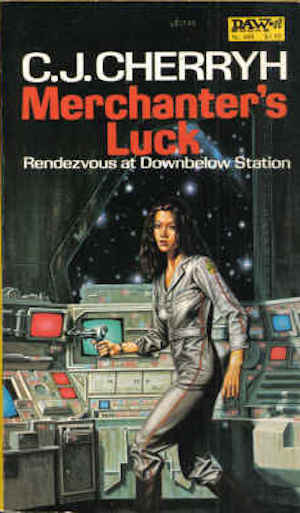
Faced with rebellion by their ungrateful colonies, the Company dispatched heavily armed warships under the command of Conrad Mazian to bring the colonists to heel. The expedition failed. Refusing to accept the outcome of the Company War, Mazian and his fellow Mazianni renounced the Company and turned pirate.
A complicated plot follows.
As I recall the backstory, Mazian isn’t just outraged that the Company stabbed him in the back by accepting peace terms. By the time peace breaks out, Mazian and company have committed war crimes and alienated all of their former allies. Their fate (should they ever surrender) would be grim.
Marque and Reprisal by Elizabeth Moon (2004)
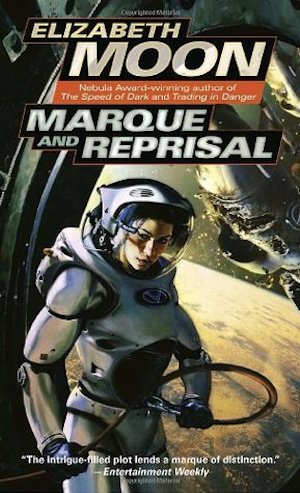
Ky Vatta has survived personal and professional disgrace as well as attempted mutiny. She should be on course for a career as a successful interstellar trader as an agent of the Vatta Corporation. But Vatta Corporation’s senior management—Ky’s family—was killed by pirates. Ky and her crew have been forced to operate as free agents if they are to survive at all.
In addition to taking down the Vattas, the pirates destroyed the ansible network that binds settled space. Each world is now on its own, easy prey to better-armed pirates (who turn out to have ambitions to found an empire). The world must form a united defense; Ky and her ship are tapped as defenders. She soon finds that she must not only fight pirates, but must deal with trusted contractors who are sabotaging her mission.
Sir John Harington (1561-1612) once said:
“Treason doth never prosper: what’s the reason?
Why, if it prosper, none dare call it treason.”
Piracy and general brigandage follow similar rules. If you’re good enough at it, you become the government. Don’t expect praise and accolades if, for example, you make the mistake of being the antagonists in a multivolume military SF series.
Bodacious Space Pirates directed by Tatsuo Sato (based on the light novels by Yūichi Sasamoto) (2012)
The worlds of the warring Stellar Alliance have been absorbed by the Galactic Empire. The privateers who prospered under the fractured Stellar Alliance would now be surplus to requirements…were it not that the empire found a new role for them. They would become pirate cos-players for the amusement of tourists. This involves less carnage but more paperwork.
This is where high schooler Marika Kato enters the narrative: Unbeknownst to Mariko, her father was Space Pirate Gonzaemon, captain of the privateer Bentenmaru. On Gonzaemon’s death, his letter of marque—that license vital to legal privateering—became Mariko’s. Letters of marque can only be inherited, not sold or purchased.
The crew of the Bentenmaru pleads with the high school student to add “pirate queen” to her list of teenage pastimes. Tempting! But not only is space piracy dangerous, it may also lower Mariko’s grade point average.
This anime is notable for: exuberant high schoolers and excellent high school yacht clubs, surprising amounts of paperwork, and of course deadly space combat. IMHO, it is most notable for its opening theme song, Mōretsu Uchū Kōkyōkyoku Dai Nana Gakushō “Mugen no Ai”2 , which can be an incredible ear worm. I have included the video above to ensure that you know how to avoid it.
The Red Scholar’s Wake by Aliette de Bodard (2022)
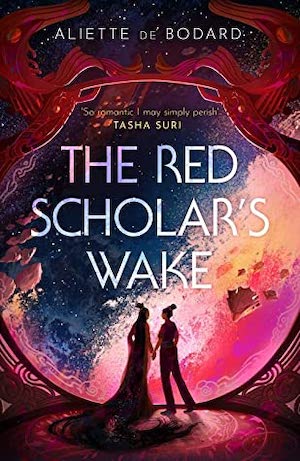
To fall into the hands of space pirates is a disaster, at least for poor wretches like Xích Si. The best she can expect from the pirates is involuntary indenture. The worst is much, much worse. Xích Si also loses hope of ever seeing her daughter again, for should Xích Si even try to contact her child, the An O Empire would execute the child as an accessory to piracy.
To Xích Si’s astonishment, she is not immediately enslaved or murdered by her pirate captors. She is saved by the recently widowed mindship Rice Fish, who needs an ally with Xích Si’s technical skills. Therefore, the sentient Rice Fish proposes a trade: if Xích Si agrees to use her abilities to expose the traitor within the pirate council, Rice Fish will marry Xích Si and provide her with exalted status and safety…at least, safety compared to the lot of a lowly slave. Death is still very much a possibility.
Readers brought up on heart-warming entertainments like The Pirates of Penzance may be astonished to discover these pirates rob and kill people. The pirates, who are modeled on historical South Sea pirates under pirate queen Ching Shih, can make a case that circumstances force their hands and that piracy is the least bad choice open to them. Perhaps, but it is of little comfort to their victims.
***
No doubt you have favourites, lurking like some sort of fox out in the stars, works that I did not mention. If so, comments are, as ever, below.
In the words of fanfiction author Musty181, four-time Hugo finalist, prolific book reviewer, and perennial Darwin Award nominee James Davis Nicoll “looks like a default mii with glasses.” His work has appeared in Interzone, Publishers Weekly and Romantic Times as well as on his own websites, James Nicoll Reviews (where he is assisted by editor Karen Lofstrom and web person Adrienne L. Travis) and the 2021 and 2022 Aurora Award finalist Young People Read Old SFF (where he is assisted by web person Adrienne L. Travis). His Patreon can be found here.
[1]Classic police procedural/supernatural/blatant Canadian propaganda television show “Due South” featured on its sound track the folksong “Henry Martin” (https://en.wikipedia.org/wiki/Henry_Martin_(song)) in which the youngest of three brothers is chosen by lot to turn pirate “For to maintain his two brothers and he.” I have questions, starting with why, if they could afford a warship, they didn’t invest that money in less dangerous pursuits.
[2]“Bodacious Space Symphony’s Movement VII, Infinite Love’” by idol group Momoiro Clover Z and ex-Megadeth guitarist Marty Friedman.











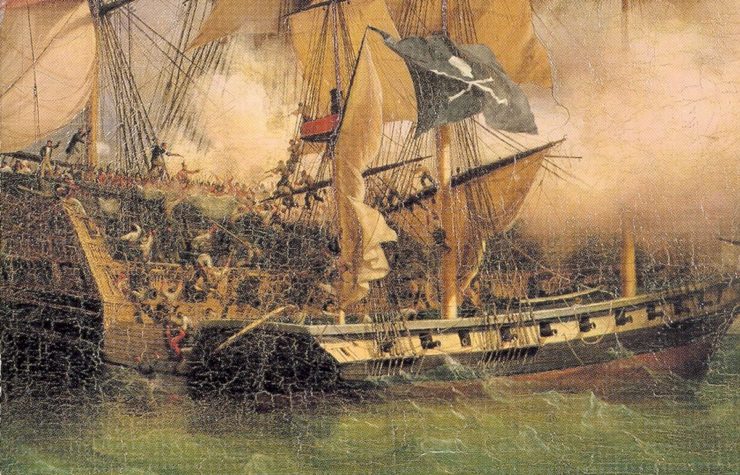
I am fond, in a “this is crack” kind of way, of Black Fire, a Star Trek book in which Spock becomes a space pirate.
It swashbuckles.
(I’ll have to find the de Bodard, that looks fun.)
Little Black Rule: in Traveller, it is canonical that piracy takes place… and it is unclear how, given the details of starship operations in the Official Traveller Universe, freelance commerce raiding is even possible, or sustainable long term in the face of a healthy government that objects to it. Some mailing lists have officially forbidden discussion of the matter.
@2 The early Pocket Books Star Trek books were fun. I have a 1st edition of Killing Time
Not exactly pirates, but Amanda Bouchet’s “Nightchaser” might fit this list. The crew of the space ship Endeavor attack other ships, stealing what they can and then delivering most of their bounty (especially medicine and food) to those in the corners of the galaxy under the government’s thumb deprived of the necessities. It’s of course not all that happens as secrets start to come to light and new questionable alliances are made. It has also been referred to as kind of like “Firefly” with a female lead.
3: It seems at least possible that a good chunk of the piracy in Traveller is tax collection by other means.
@7: And in the Pirates of Drinax campaign, the players’ activities essentially become that retroactively if they succeed. If they don’t succeed, the airlock is over there.
Tanya Huff, The Truth of Valor (2010).
If we’re allowing anime and manga, I’d have to go Space Pirate Captain Harlock!
As a kid, I never really understood what Harlock was rebelling against though. I mean corrupt government, sure I guess, but also some kind of vague desire for personal expression, freedom, and desire to be outside of regular society? This feels like such an American story in some ways.
@5: Ah, but do you have the first printing, which Pocket pulled off the shelves and pulped when they realized the text was the author’s rather frisky first draft?
(I very carefully did not let on to the Fiends of the Library from whom I bought mine that what they were asking a dollar for could probably fetch mid two figures or more if properly advertised in the right markets.)
@11. Yes, I checked after hearing about the kerfuffle.
(Details about the kerfuffle here: https://www.tor.com/2013/02/11/spock-loves-kirk-love-della-van-hise-a-careful-consideration-of-killing-time/ ).
Tales of the Letty Jay by Chris Wooding is sort of piratey?
Sorry – Ketty Jay.
Alastair Reynolds’ Revenger trilogy has quasi-Victorian solar-sailing space pirates in a far-future reconstructed solar system littered with the detritus of alien incursions. What’s not to love?
And yeah, in reference to Merchanter’s Luck, the Company fleet under Maizan had been engaged in all kinds of shenanigans even before the events of Downbelow Station (which immediately precede Merchanter’s Luck); and you can see more of those shenanigans in Tripoint and Rimrunners.
Who hasn’t occasionally felt the urge to brandish a cutlass, commandeer a galleon, hoist the Jolly Roger, and declare war against all flags? Twenty First Century Earth being what it is, I suppose it’s inevitable we would try to rescue this pleasant fantasy by relocating it in outer space. But without the exhilarating sight of wide blue ocean horizons, or the delicious flavor of the salty ocean air, I just don’t see how the experience could be even close to comparable.
@11: did not let on to the Fiends of the Library
Fiends of the Library were no doubt destroying the books?
I like the pirates in Stross’s “Neptune’s Brood”: they’re at the midpoint (quite deliberately) between actual pirates, privateers, and tax collectors.
Someday, I hope to have the spoons to write The Klingons of Klinzhai. Worf has gone back and forth in his affiliations to the Federation and the Empire, and is notably a Slave of Duty. “You have always used your knowledge of Klingon honor and tradition to get what you want from me.” “Because it always works, Worf!”
Does Miles Vorkosigan’s construction of the Dendarii Mercenaries count as piracy?
Having always loved Kelly Freas’s slide-rule-in-teeth pirate cover for the February 1959 Astounding, I recently read the novel it illustrates, Murray Leinster’s The Pirates of Ersatz (also published as The Pirates of Xan).
I found it enjoyable multi-planet adventure, with less piracy than one might expect (though still some piracy) and a reasonable amount of swashbuckling here and there. Plucky protagonist begins penniless but faces adversity with perseverance, cleverness, and skill, occasionally receiving help from unexpected quarters.
There are two supporting characters who, every time either one opens his mouth, sound like a John W. Campbell editorial, but this did not dim my enjoyment much.
Slight, but comic, SPOILER: Our hero invests the proceeds of his activities in a company that sells insurance against piracy, which has the effect of growing his fortune considerably as the plot unfolds.
(Disappointingly, slide rules do not seem to be mentioned in the text.)
@18, the call themselves the Permanent Crimson Assurance, which is great Monty Python reference. The make passing ships heave to, and then come on board and audit their books. The first book of Glynn Stewart’s series Duchy of Terra is about a Terran spaceship turning pirate/privateer after the Earth is conquered by aliens.
The Swallows and Amazon series have the Amazon Pirates, otherwise known as Nancy and Peggy Blackett, They sail the high seas of Lake Coniston, in the days of free-range children. A later book in the series, Missie Lee, features actual pirates. https://en.wikipedia.org/wiki/Swallows_and_Amazons
Henry Martyn, by L. Neil Smith, put a Raphael Sabatini-type revenge story in space. And “Doc” Smith’s Lensman series is chock-full of space pirates, as are many of the novels set in the Star Wars universe.
Jack Vance’s Vandals of the Void. If you want to go back almost seventy years.
Captain Kraiklyn and the crew of the Clear Air Turbulence from Iain M. Banks’s Consider Phlebas are requesting permission to come aboard this list. And the crew of the good ships Liberator and Scorpio during seasons C and D of Blakes 7 are right behind them.
Alastair Renolds The Revenger Series.
Space pirate space opera.
Gap Series by Stephen Donaldson. Two really nasty space pirates encounter tough young female spacer with bizarre and strangely, through an odd left turn, science fictional results and lots pf personal evolution and growth by all, including the pirates. Tremendous piece of work inspired in part by Wagner’s Ring Cycle. I was surprised not to see it here already.
Sorry. Typo.
Alastair Reynolds.
I saw someone else commented on this series. Good stuff.
I have a large pet peeve with writers who ignore the difference between pirates, smugglers and privateers. I can’t help but feel that they besmirch tax-avoiders, political operatives by comingling them with murderous thieves. So it’s always a pleasure to read when someone gets it right.
Second, or third, Alastair Reynolds’ Revenger series. Not his best work but very enjoyable.
There are space pirates in the Revelation Space series, like Run Seven, but they don’t appear very often.
Nova by Samuel R Delany (1968) gives strong Treasure Island, a ragtag pirate crew of misfits vibes.
Winds of Marque by Bennett R. Coles is also great fun! Even if it’s about privateers rather than pirates.
@3: It’s amazing isn’t it, how many small to medium population planets with decent starports there are in Traveller, ones that have no discernable source of income.
Also, pirate vessels are acquired by loans, presumably backed by megacorporations. Almost as if those megacorporations want deniable assets that can target the shipping of rival corps…
Although not primarily about piracy, the novel Ghost Fleet turns on a bit of space privateering: in a confrontation with China the USA is stymied by a new technology mounted aboard a Chinese space station that allows China to instantly pinpoint the location of every nuclear-powered submarine in the world. A billionaire successfully launches a private venture to board and seize the space station; afterwards, the US defense establishment is shocked to discover that the signed letter of marque the billionaire insisted on is not just a quaint archaism but a legal and powerfully binding contract giving the billionaire ownership of the seized station.
Oh how I love Mouretsu Pirates / Bodacious Space Pirates. It’s a bit silly, sure, but it’s got a good heart and it’s remarkably wholesome considering the premise is “what if a teenaged girl in a skirt was a pirate captain?” Also, it does a very good job of showing the work Marika has to put in to get good at her new job. She has natural talent, sure, but needs experience… which is what, we all know, you get when things don’t go quite right…
(Also, the ending theme is my favorite of the two songs for that show.)
Elliott Kay’s Poor Man’s Fight / Rich Man’s War series has some space pirates. Heavily based on the (real life, historical) pirates of the Caribbean.
Non-space, but fantasy: Pyrates, by George MacDonald Fraser, which is basically all Hollywood Pirate tropes dialed to 11. Tried re-reading it recently, and hoo-boy, the racism fairy had not been idle in the years between my first read and my attempted re-read.
+ At least five Jack Vance books
Life Under the Jolly Roger, by Gabriel Kuhn, is a study of the Golden Age of Piracy. It gives the facts about historical pirates, and is very well researched. But what really makes it great, is it also looks at representations of pirates in popular culture. Pirates are symbols of human freedom and empowerment, so fantasies and myths about pirates are important and meaningful even when they aren’t historically accurate. The Golden Age of Piracy lasted a very short time, but stories about pirates are still being told, to this day.
There’s also the Pirates Planet saga , by Elisabeth Moon & Anne Mc Caffrey
https://en.m.wikipedia.org/wiki/Planet_Pirates
It’s about the hunt against these brutes and who helps them
In F.M. Busby’s Bran Tregare/Rissa Kerguelen cycle, near the beginning Tregare leads the mutiny that seizes the ship of the fascist UET on which he serves; I’d think he and his cohorts qualify as pirates as well as rebels, at least starting out.
IIRC, one of the Honorverse novels is about an anti-piracy patrol in the Silesian Confederation; if the presence of the Mazianni qualifies Merchanter’s Luck for inclusion, then presumably this would also qualify.
@20: I assume the slide rule is for space navigation calculations.
Star Trek novel “Prime Directive” has the crew in disgrace after a disaster at Talin IV. The planet is under embargo but the main cast separately make their way there to try to clear their names, one way being to sign up with evil Orion pirates, oops… who then encounter another pirate ship and fight, also oops.
At one point in The Long Way to a Small, Angry Planet, the intrepid crew of the Wayfarer find themselves boarded by pirates, who turn out to be surprisingly reasonable.
And let us not forget Stanislaw Lem’s Tales of Pirx the Pi–oh wait never mind…
In Merchanter’s Luck, just who is the swashbuckling pirate? Edger of Australia? Mallory of Norway? Sandor of Lucy? Nah. My bet is actually on Allison, late of the Dublin Again, who swashbuckles her way into promotion to helm-2 …
Beyond the Star Wars novels (and possibly of interest to Travellers players), a number of the old Star Wars RPG sourcebooks published in the 90s by West-End Games centred on piracy, notably Pirates and Privateers, and The Far-Orbit Project.
Pirates and Privateers was basically a how-to guide on how to be a pirate run a pirate-based campaign. The fun part is that pirate fiction exists in-universe, so this also serves as a sort of meta-commentary on how different “real” piracy is from the melodramatic and romanticized holo-dramas. Notably, it stressed piracy as a business (how shares should be properly distributed, black market economics, why a reputation as a bloodthirsty cutthroat is a bad thing, etc).
The Far-Orbit Project was more of a campaign setting, focusing on one particular pirate ship (the Far Orbit) that signed up with the Alliance to become privateers (and exactly what accommodations had to be made on both sides; the Alliance flatly outlaws slaving, and requires the presence of an on-board Observer to serve as a point of contact with High Command).
@27: I made the mistake of trying to read all 5 Gap books together, and found them indigestible even though the concept of borrowing from Wagner, and his interpretation of Wagner, were fascinating. Maybe they read better at intervals?
@44: ISTM nobody swashbuckles in Cherryh books, not even so they can be shown up; specifically, Alison makes a cold-blooded deal with her superiors on Dublin Again to leapfrog the seniority tree. (That sounds painful — maybe sidestep it?)
pace @29, the hero of The Star Fox is quite familiar with the difference between pirates and privateers, which is why he goes to a nation that still has just enough sovereignty in ~united Earth to issue a letter of marque and reprisal.
The Mouretsu “pirates” are technically privateers, but I’m not sure Japan imported that distinction.
The show is also notable for avoiding any panty shots, despite having a dozen of schoolgirls in above-knee skirts in zero gravity, where you would think panty shots would be immediately inevitable. Fans infer some high tech in the skirts.
I also infer that Marika has never used a comb.
In one of Alexander McCall Smith’s “Scotland Street” novels an anthropologist spends months with a primitive tribe who are rumoured to be pirates. At last, she gains their trust and is allowed to accompany them when they set out on their pirating voyage.
To discover that what they are pirating is CDs and DVDs, making fakes in a small Indonesian factory and bringing their wages back to the village.
Not at all SF/F, but amusing.
Of course, there’s always The Last Saskatchewan Pirate. Unemployed, dispossessed farmer turns to piracy on the Saskatchewan River.
What shall we do with a drunk space pirate ?
@16: Treasure Planet! I should re-watch that movie soon.
For those who don’t know: Lightships sail the vast aether that lies between planets! Sailboarding through the sky! Yo ho ho and avast me hearties, run up the sails and watch ’em glow! But don’t stray too far from the ship, or its personal gravity will cease to keep you safe, and away you will drift, never to be seen again…
Also possibly the best Long John Silver ever put on film, pace Tim Curry.
A spaceship repair girl supposedly named Rachel by Richard Riordan, author of the Please Don’t Tell my Parents series offers us space pirates, young space pirates in training, a heroine who just wants to repair spaceships who is constantly being recruited and/or kidnapped by space pirates, and the revelation that the solar system is entirely different than can be perceived from Earth, because Earth and all its inhabitants are infected with Math. More hectic than funny, but I expect it will get better as the series progresses.
The crew of the Rocinante in The Expanse get pretty close to being privateers at times, but never quite become pirates.
Galactic Menace, Hull Damage, and Unconstant Love by Timothy J. Meyer
See also Heinlein’s Citizen of the Galaxy, in which there are “raiders” (essentially space pirates), who seize ships and sell their captives into slavery. Although the raiders do not actually appear in the main narrative (until Thorby shoots one down while working fire-control aboard the Free Trader ship Sisu), it is the struggle to stop them that drives the story–Thorby’s wealthy family corporate conglomerate may be secretly profiting from the slave trade, and his mentor, Baslim, is a government agent trying to stop it.
Now I want to hear the stories of the repo men who go after space pirates that are behind on their loan payments. It seems like pirates would be a bad credit risk even aside from the possibility of being held liable as an accessory to their piracy.
That is one of the important differences from privateers, who have some governments and ports that they can consider friendly.
@42 Yeah, navigation calculations … I’m reminded of a character in Heinlein’s Future History stories, Andrew Jackson “Slipstick” Libby, who’s a highly gifted and intuitive mathematician with little formal education. I remember when reading the story many years ago that references to slide rules would be wildly anachronistic by the time of the story’s setting.
(I own one that probably belonged to one of my parents. I was never properly taught how to use one, and I went to a science-oriented HS; by that time, pocket calculators were being more widely used.)